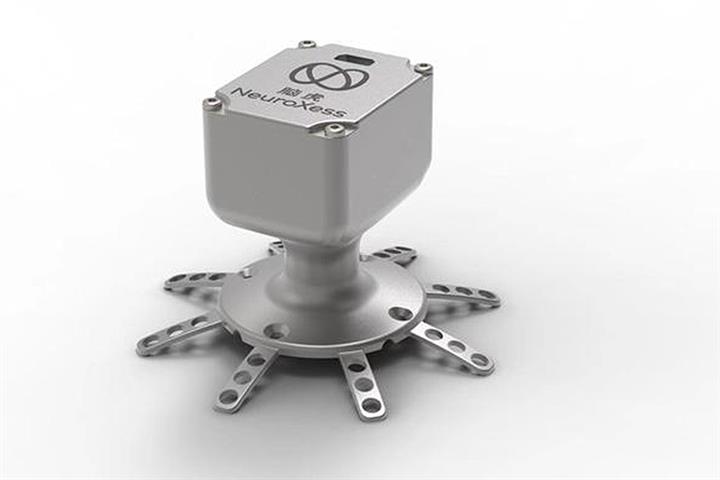 China's First Semi-Invasive Brain-Computer Interface Device Is Unveiled in Shanghai
China's First Semi-Invasive Brain-Computer Interface Device Is Unveiled in Shanghai(Yicai Global) Sept. 5 -- China's first semi-invasive brain-computer interface apparatus, that serves as a direct communication pathway with the brain and can be used to help patients overcome motor or sensory impairments, was put on show at a recent AI summit.
The device, weighing just 38 grams and measuring only 32 cubic centimeters in size, can be used in the treatment of Parkinson’s disease, epilepsy and other neurological diseases, co-developer Peng Lei said at the World Artificial Intelligence Conference in Shanghai on Sept. 2.
The apparatus, which does not require semi-manual preparation like most medical devices, boasts a unique silk protein electrode wrapping technology that can avoid blood vessels when implanted in the cerebral cortex and in this way minimize damage, said Peng, who is also founder and Chief Executive Officer of life sciences firm NeuroXess.
BCI technology allows patients with impaired motor-perceptual functions, such as sufferers of amyotrophic lateral sclerosis, high paraplegia and aphasia, to still ‘talk’ with their minds although they cannot speak, the other co-developer Tao Hu told Yicai Global. And although they cannot move, they can still control external mechanical equipment.
Peng and Tao, who is also deputy director of the Shanghai Institute of Microsystem and Information Technology at the Chinese Academy of Sciences, have made great strides in the practical application of this cutting-edge technology. Last year, Tao won the WAIC Super Artificial Intelligence Leader Award and this year he presented the technology in the form of equipment.
So far, the device has passed clinical ethics reviews by medical institutions such as Huashan Hospital and Ruijin Hospital, and is now undergoing clinical trials for the treatment of major neurological diseases such as ALS and high paraplegia, industry insiders said.
BCI tech can better protect the parts of patients' brain that control the hands, feet, cognition and language, and minimize invasive damage, said Mao Ying, a senior expert in frontier neurology and president of Huashan Hospital.
BCI tech is complex engineering and requires the convergence of multiple disciplines such as microelectronics, neuroscience and psychology, Peng said. But with continuous breakthroughs in fundamental technologies in different fields, we believe BCI tech will soon reach a major inflection point, he added.
"Last December, US BCI firm Synchron enabled patients with ALS to send messages directly on social media,” Peng said. “And this year a study published in medical journal Nature showed that humans typing with mindpower can achieve 99 percent accuracy.”
Looking ahead, Peng said that over the next five years BCI devices will be mostly used to help patients with ALS, high paraplegia and visual as well as auditory impairment. But over the next decade, BCI tech will branch into health, games, education and other fields. It will be able to help children to improve their concentration and alleviate attention deficit hyperactivity disorder.
In the future, BCI tech is expected to realize the merging of knowledge, emotion and memory so as to advance the coexistence of humans and computers.
Editors: Shi Yi, Kim Taylor